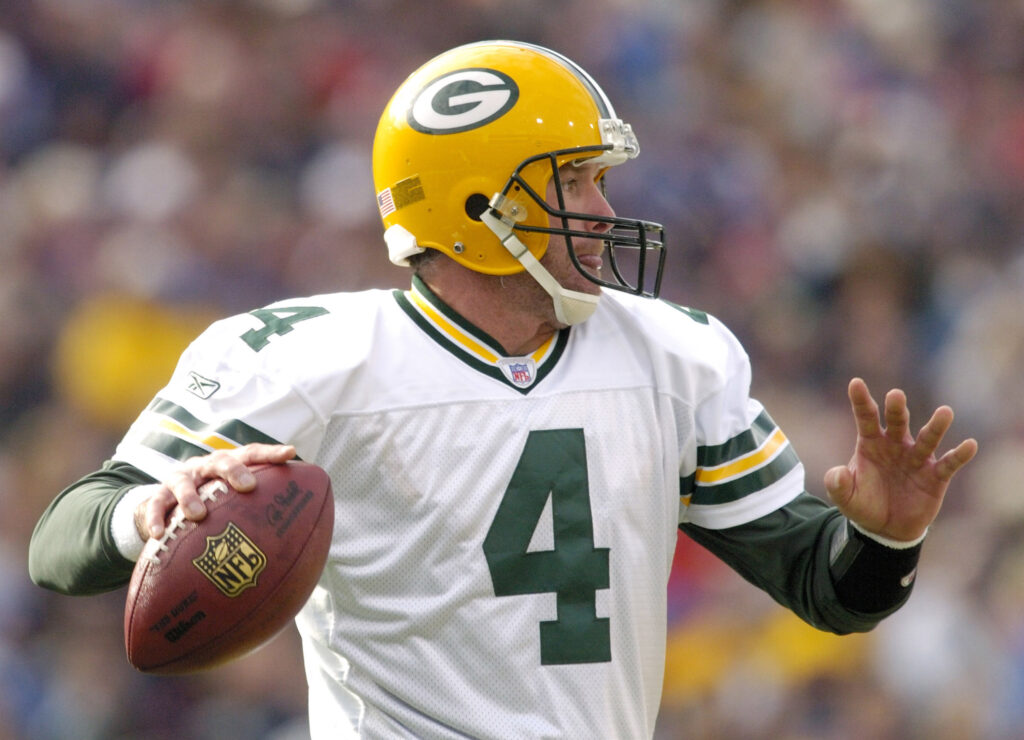Former Green Bay Packers quarterback Brett Favre, seen here in a 2006 NFL photo, announced before Congress that he has Parkinson’s disease, likely related to his numerous concussions. He was discussing a scandal in Mississippi involving the transfer of millions of dollars from funds intended for poor families to help finance a volleyball stadium that was a pet project of Favre’s. Photo by Getty Images. (Mark Konezny | NFLPhotoLibrary)
In a moment that sent shockwaves through the sports world, Hall of Fame quarterback – and Green Bay Packers legend – Brett Favre revealed that he suffered from a neurological disease known as Parkinson’s. Favre was testifying before a U.S. congressional committee about a business scandal that dealt a severe blow to his reputation In recent years, Favre had been the lead investor in a pharmaceutical company called Prevacus. The shady venture had received $2 million in welfare funds from the state of Mississippi. In July, Prevacus founder Jacob VanLandingham admitted to using welfare money to pay off gambling debts and pleaded guilty to wire fraud. Favre was also accused of profiting from the theft, a charge he strongly denies.
Favre’s testimony before Congress was an emotional one, as in his opening statement on the ugly case, he revealed his shocking diagnosis. “Unfortunately, I also lost an investment in a company that I believed was developing a breakthrough concussion drug that could help other people,” Favre said. “And I’m sure you can understand why it’s too late for me, because I was recently diagnosed with Parkinson’s disease. It’s also a cause that’s very close to my heart.”
The news, while tragic and shocking, was also not surprising. Parkinson’s disease can be triggered by excessive blows to the head, traumatic brain injuries or repeated concussions. Perhaps the most famous Parkinson’s patient was the boxer who, late in his career, took a beating like no other: Muhammad Ali. Favre played football like his elder: he was hit regularly, but he always came back for more. No one comes close to Favre’s record of 297 consecutive games started. That’s not just for quarterbacks; it’s for all players. In Favre’s day, unlike today, hitting a quarterback in the head or pushing him to the turf was legal and lauded. In a 2018 interview with the Today Show, Favre said that while playing, he was diagnosed with “only” three or four concussions, but also commented“When you have ringing in your ears, you see stars, that’s a concussion. And if it’s a concussion, I’ve had hundreds, maybe thousands, throughout my career, which is scary.”
There will be defenders of football who will no doubt say that you can’t “blame football for Favre’s condition.” They are like the tobacco executives who deny any link between smoking and lung cancer. In a major investigation, produced by Boston UniversityAccording to the Concussion Research Institute, people who had suffered head injuries were 61 percent more likely to develop Parkinson’s disease. That’s astounding. The National Football League and its feckless commissioner Roger Goodell would be wise to step up and not play the role of clueless tobacco industry executive and talk about the league’s funding efforts to find new treatments. They should explain how they are trying toMake the game safer. They should face the fact that their sport can have horrible consequences.
The announcement could also mark a turning point for Favre. Even for his most ardent fans — and he has legions of them — it has been exhausting to laud this man as a sports hero. In the public eye, he has displayed myriad flaws. There have been the pill addictions, the attempted infidelities and now, most shamefully, the accusations that Mississippi’s favorite son was stealing funds meant for the state’s poorest residents. But Favre has always had a loyal following — especially in Wisconsin — who will always appreciate the way he gave his all week in and week out with a boyish, daredevil smile. They love the player more than the man, but when those categories inevitably spill over, they accept the contradictions because he has their hearts: His flaws are simply part of what makes him human.
Favre is now football’s suffering saint: a great quarterback brought low by the game he played as a small child in his backyard. He can be an object of sympathy rather than a source of shame. Favre will undoubtedly receive support from all sides. If there’s one thing we’ve learned about Parkinson’s disease, even with new treatments in development, it’s that he’s going to need it.
This commentary is published as a joint project of the Wisconsin Examiner and The Progressive magazine.

